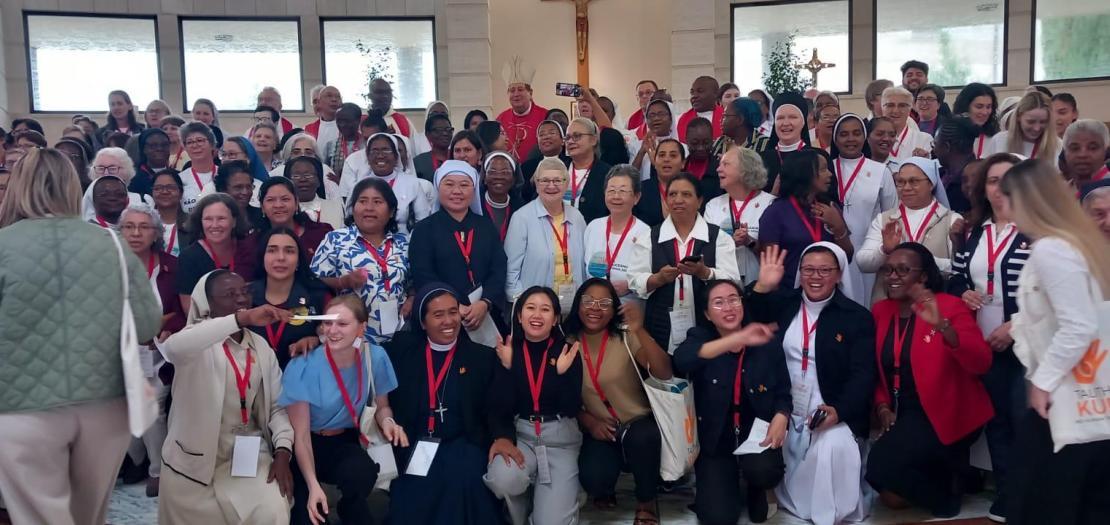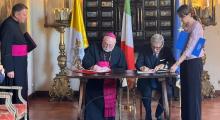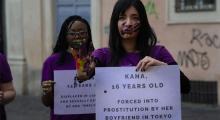Issued by the Catholic Center for Studies and Media - Jordan. Editor-in-chief Fr. Rif'at Bader - موقع أبونا abouna.org

The Talita Kum International Network Second General Assembly, which convened session in Rome on May 18-24, 2024 with the participation of 92 countries represented by consecrated men and women and the laity in the Fraterna Domus Monastery in Sacrofano—Rome, issued the following declaration:
We, 153 delegates and participants from 71 countries, representatives of the 60 Talitha Kum (TK) networks committed to ending human trafficking on all continents, gathered at the 2nd General Assembly of Talitha Kum at Fraterna Domus in Sacrofano from May 18-24, 2024, with the theme “Journeying Together to End Human Trafficking: Compassion in Action for Transformation,” in order to:
- Share experiences and listen to the grassroots.
- Embrace our identity and diversity as an international network of networks.
- Strengthen relationships, networking, and collaboration.
- Revisit our priorities for action in light of emerging realities.
- Celebrate 15 years of Talitha Kum.
The power of Pentecost fills us with prophetic hope. The Holy Spirit emboldens us to persevere in eradicating human trafficking to create a future where “all may have life and have it to the full” (John 10:10). We hear in the pain and suffering of persons wounded by human trafficking the call of Jesus that generates life: “Rise up!” (Mark 5:41) We pray for eyes to see the reality of trafficking, hands that reach out to those affected, a heart filled with care and compassion, and feet to journey forward together on a path of transformation.
As we recommit to the three priorities from our 1st General Assembly in 2019, we recognize that the world has changed dramatically in these past 5 years. Our diverse cultural contexts are marked by accelerating change, intense globalization, rising migration, exponential growth in the use of technology, the devastating impact of climate change, the COVID-19 pandemic, and the conflicts that currently ravage many parts of our world. Today, these emerging realities call Talitha Kum to commit to our next three priorities for 2025-2030, which we have discerned using the synodal method of Conversation in the Spirit.
PRIORITY 1--SYSTEMIC CHANGE IN THE FACE OF NEW VULNERABILITIES:
The complex systems that enable human trafficking need to be dismantled through concrete steps towards social, economic, cultural, and political transformation. We denounce the many factors that leave people trapped in modern forms of slavery: discrimination and violence against women and minority groups, exploitation of vulnerable persons especially children, patriarchal systems, internal displacement, forced migration, terrorism, conflict and war, unfettered market capitalism, corruption, racism, organized crime, inadequate immigration laws, and inconsistent law enforcement. These realities cry out to us, and so we commit to:
- Empowering women, children, and youth towards more just, equitable societies.
- Adopting effective strategies to reduce the demand for human trafficking, including through education for boys and men and advocacy for regular migration pathways.
- Advocating for the prosecution of traffickers and for effective policy and legal changes for at-risk populations, including migrants, refugees, and displaced persons.
- Addressing the push and pull factors of migration and displacement, advocating for the protection and integration of people on the move.
- Exposing the risks of online trafficking and social media by sensitizing young people and their families and promoting cyber safety.
PRIORITY 2--HOLISTIC, SURVIVOR-CENTRED APPROACH:
Our experiences of walking with people who suffer because of trafficking shows us the human face of this global phenomenon. We are called to take a holistic, long-term approach to journeying with trafficked persons that aims at their integral healing and flourishing, walking together in dignity and empathy. This calls upon TK to be more intentionally survivor-centred, survivor-informed, and trauma-sensitive – listening to their stories, consulting them in decision-making processes and putting them at the heart of our networks. We open our ears to hear the silent cry of diverse forms of human trafficking, which affects women, men, youth, and children. Promoting the protagonism of survivors in our network is an essential key to improve our capacity to prevent human trafficking and to act with empathy, care, and unconditional acceptance towards those whose lives are affected by it. Their resilience inspires our perseverance to eradicate human trafficking in all forms. We commit ourselves to:
- Caring for survivors as valued members of our TK family.
- Promoting safe and secure spaces/shelters, survivor-to-survivor peer support, and survivor-led initiatives.
- Establishing spaces for non-judgmental listening, hotlines, and mobile app reporting.
- Linking survivors to education, health services, skill-building, housing, legal aid, and job opportunities.
- Offering psycho-social support and providing spiritual accompaniment for survivors, as well as psychological and legal support and training for TK members and partners.
PRIORITY 3-- BROADENING COLLABORATION AND PARTNERSHIPS:
We realize that we are not alone and that this work cannot be done in isolation. Within TK, this means diversifying our membership and multiplying our impacts. TK is alive today thanks to the courageous and enduring commitment of women religious and their collaborators. Rooted in their prayerful witness, we see lay people, clergy, and young people as key to the long-term sustainability of our work to end human trafficking. We commit ourselves to community engagement and call for broad-based collaboration with Church leaders, other religions and faith communities, governmental organizations, NGOs, women and men, young and old, so that together we can:
- Find creative ways to raise awareness in the face of the globalization of indifference, inspired by Fratelli Tutti.
- Stand up for equality between women and men and respect for human rights.
- Share resources, best practices, data analysis, and the online TK international directory.
- Confronting the impact of climate change and mitigating its underlying causes, inspired by Laudato Si’.
- Pray for an end to human trafficking, widening the reach of the International Day of Prayer and Awareness on February 8th.
- Foster the active involvement of young people, particularly TK youth ambassadors, and empower them as leaders of our online campaigns to raise awareness.
- Together, our actions have the power to transform lives with compassion,
towards a world free of human trafficking.
It is worthy to note that Talitha Kum is the International Network of Consecrated Life Against Trafficking in Persons. Headquartered in Rome, Talitha Kum is part of the International Union of Superiors General (UISG), in collaboration with the Union of Superiors General (USG). Talitha Kum coordinates the anti-trafficking efforts of Religious Sisters, facilitating networking, communication and formation, according to the strategic planning of the UISG and the Social Teaching of the Catholic Church.
Talitha Kum’s work with victims and survivors of human trafficking is grounded in the belief that the dignity of the oppressed and exploited can be restored through sororal and fraternal relationships, marked by the presence of the Holy Spirit and the mysterious encounter with God. In a relationship between equals, Sisters walk together with victims along the path of healing, as they themselves regain a deep awareness of their inner value as individuals and members of their families and communities. In this manner, Talitha Kum addresses the systemic causes that leave people at risk of falling into the hands of trafficking networks, engaging families and local communities together with key stakeholders at the national and international level.
Talitha Kum vision implies commitment to being neighbors to those who suffer the serious consequences of trafficking in persons,namely men, women, children, and families. The actions of Talitha Kum are aimed at all those who are robbed of their dignity and deprived of liberty, regardless of their lifestyle, race, religion, economic or sexual orientation. The members of Talitha Kum living and bearing witness to Christian values, dialogue with and show respect for members of the different religious traditions and for non-believers.







